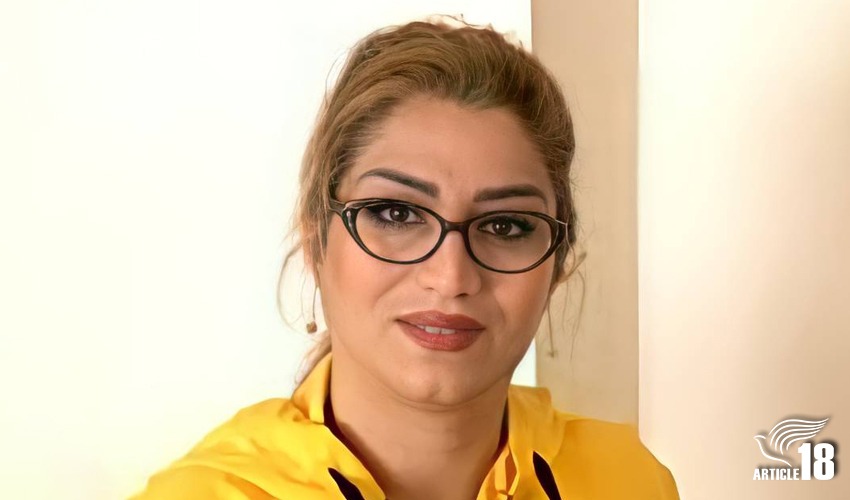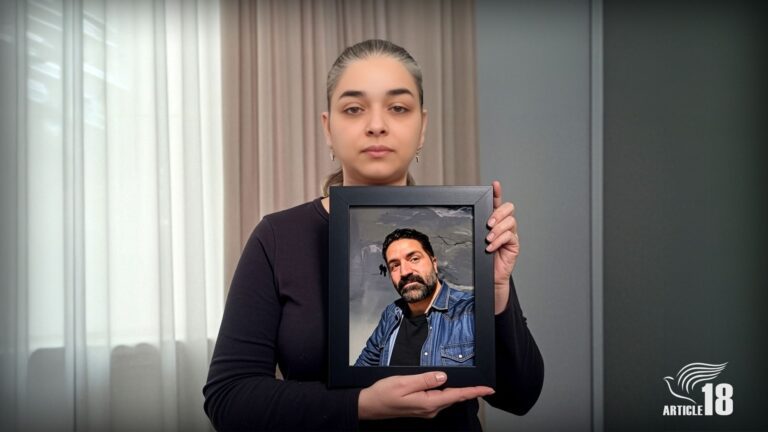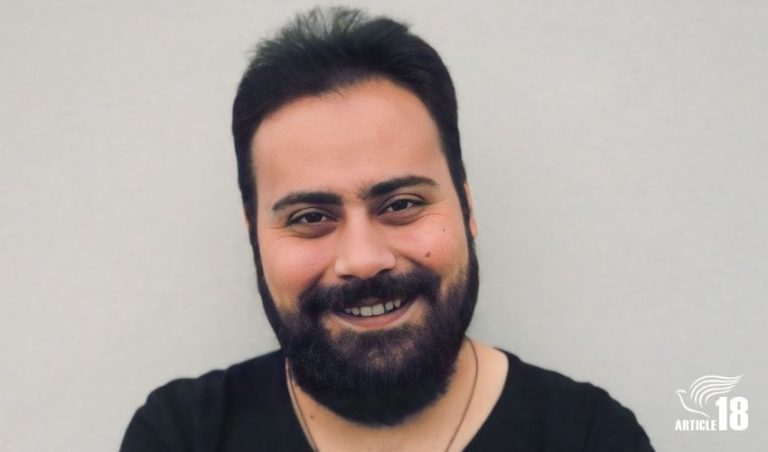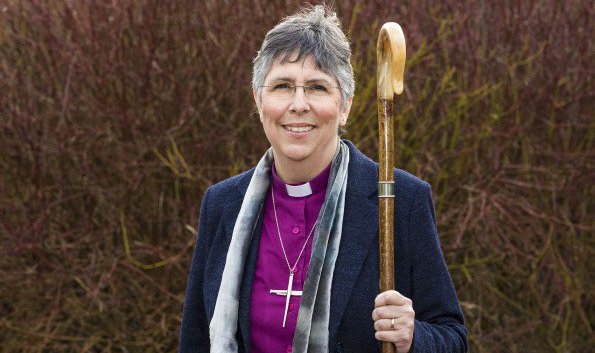
Emma’s interrogator said her arrest was part of a major national operation, in which Christians in as many as 23 other Iranian provinces had been detained.
It was the day after Christmas in 2010, just two months since the Supreme Leader, Ayatollah Ali Khamenei, had warned in an infamous speech in Qom that the spread of house-churches were among the “critical threats” facing the Islamic Republic – by “deceiving young Muslims”.
It was a speech that made headlines around the world, and it seems as though Emma’s interrogator was one of those listening.
“He said that if they don’t stop Christians, and the Church, the security of the country would be at risk,” Emma recalls.
The Supreme Leader would have approved.
Emma, whose birth name was Azam Safaei, had been arrested at her home in Bandar Abbas, southern Iran, early in the morning of 26 December.
“It was between 6.30am and 7am when someone rang our doorbell,” she explains. “It was cloudy that day. I heard the bell, but I was still sleepy. Suddenly, my husband, Peyman, said loudly: ‘Get up, grab everything you can, and clean up. The MOIS [Ministry of Intelligence Service] are here. They’re climbing over the wall!’”
Four male agents proceeded to enter their home, waking up their school-age children, Negar and Navid, whom Emma says were “terrified and wanted to know what had happened”.
Eventually, the children were ordered to go outside and play in the garden.
“But out of curiosity, and also fear, from behind the curtain they tried to look inside the house,” Emma says, until an officer ordered them not to.
The agents then searched the property for anything related to Christianity, placing all they found on the floor of the family’s main room. These were the items that were to be confiscated.
They included, in Emma’s words, “paintings of Jesus and the Last Supper, a beautiful carved wooden cross, and a crystal cross we had bought from Kish [an island in the Persian Gulf], different Christian books, and a Bible which I had recently got for my mother”.
None of these items were ever returned.
Search completed, Emma was escorted out of her home and told to keep her head down as she was driven away to an unknown location.
She was then blindfolded and made to hold onto a roll of paper, with which she was led into a building.
“There were people laughing at me and telling me to be careful not to fall,” Emma explains.
Emma’s friends, Aram and Shabnam, had also been arrested, and were interrogated simultaneously over the following two and a half days, in an effort to gather as much information from them as possible about their house-church.
Emma was not allowed to contact her family during her detention, and both she and Shabnam were told they would be killed after their release.
Inside the prison, Emma’s biggest fear was rape.
She says that during her arrest, “the fear of being raped kept coming to my mind, and this made me suffer.
“We had heard a lot about the rapes of women, and even men, during the detentions in 2009 [after mass protests]. We were not afraid of going to prison, but we were afraid of being raped.
“Once, a man entered my solitary cell, with his shoes on, and other officers locked the door from the outside. I was very scared.
“He had a piece of paper in his hand, and he asked me medical questions. But after the interrogation ended, he asked, with a strange smile on his face, ‘Do you have experience being arrested? Does your husband know you’re here?’ I tensed up, became defensive, and didn’t look into his face. I only said: ‘Yes, he knows I’m here.’”
When Emma later refused to sign a piece of paper committing to no more involvement with Christians, she says her interrogator, knowing her fear of rape, used this “weakness” to imply that if she stayed in prison any longer, that would be the consequence.
“He said with a grin: ‘It seems as though you like it here and would like to stay longer?’ He had found my weakness, and started to speak suggestively,” Emma says.
“I bowed my head and said that I wouldn’t sign what he had written – that it would be like still being in prison, and take away my basic rights. How could I not connect with anyone?”
So the interrogator took another sheet of paper and changed some of the wording.
This time it read: “You don’t have the right to evangelise. You don’t have the right to gather with church members. You can’t travel from Iran to Armenia or Turkey. You must obtain written permission to travel to other cities within Iran… All until the judge issues a verdict.”
When Emma was finally brought before a judge – “a young man, strongly built” – she was struck by the cleanliness of the room.
“It felt very odd to see such a clean room in that place,” she says. “The smell of coffee also filled the room. Everyone was drinking coffee.”
This was in stark contrast to the place she had been held, which Emma describes as “a very dirty room with no windows… My body was itching because of the dust and dampness of the environment. The walls were painted only superficially; beneath the paint, you could see the scribbles of former prisoners. It was very depressing and suffocating.
“I asked for soap and they said there was soap. I told them that it was small and dirty. They laughed and said: ‘She thinks she’s come to a hotel!’”
The judge told Emma that what she had said in her interrogations about God being able to speak to people was blasphemy, and asked whether she already knew that his verdict was going to be the death sentence.
Emma’s response was both shocking and courageous.
“I said that if the God that I love issued my death sentence, then I would be ready to die,” Emma says. “The judge became angry and said that I was naive, looking for trouble, and that I had been deceived.”
This wasn’t the first time Emma had been threatened with death for her decision to become a Christian.
Inside the prison, she says “Ayatollah Khamenei’s speech about the death sentence for apostasy from Islam was regularly played over the loudspeakers”.
Nor was it the first time Emma had exhibited her extraordinary courage.
During her interrogations, Emma had written that “Ayatollahs Khomeini and Khamenei had come in the name of God and the people had believed them, but after a while the executions started and people started to realise that theirs was not the religion the people were looking for”.
Seeing this, her interrogator had warned Emma that “my writings had become political and that my case would now become more complicated. He told me not to write things that could be used against me”.
After Emma was released, pending the final verdict in her case, her husband Peyman was also summoned for interrogation.
“They interrogated him every morning for one week, and didn’t release him until night,” Emma says.
Having decided to remain in Iran, the couple opted to relocate – first closer to her Emma’s family, then to Kerman, 500km north of Bandar Abbas, and then, just three months later, to Sirjan, west of Kerman.
But Emma says that in every location it was clear they were “under observation”.
“They found us easily as soon as I registered my children at school,” Emma says. “They put a lot of pressure on my daughter and were focused on her. Even though she was going to a private school, she was forced to wear a chador [full Islamic covering] and to attend Islamic prayers and make a commitment not to choose Christianity under duress but only by her own free choice.”
Emma had been told during her interrogations that she was prohibited from leaving the country, but when they received an invitation to go to Turkey, the couple discovered they were in fact free to travel.
Then, like so many other Iranian Christian converts, they took what seemed like their only remaining option.
Emma puts it this way: “We assessed the situation and realised that we could no longer serve as Christians in Iran. We lived in Sirjan for three months, then left Iran.”
You can read Emma’s full Witness Statement here.



0 Comments
Trackbacks/Pingbacks